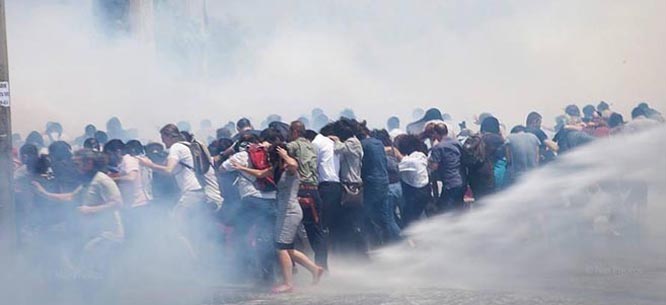Opening Taksim Square
Opening Taksim Square
Istanbul’s Taksim Square rose up on May 29, and the “Occupy Gezi” movement has since exploded across several Turkish cities, taking various forms. Last week, it went on strike.

It’s been about a week since Istanbul’s Taksim Square rose up, and the “Occupy Gezi” movement has since exploded across several Turkish cities, taking various forms: environmentalist sit-in, pro-democracy rally, street festival, and urban riot. This week, it went on strike. Several unions are leading a work stoppage affecting some 240,000 workers. What shape the movement will take next is an open question.
Since the protests began in late May as a liberal-oriented environmental campaign to protect Taksim’s cherished Gezi Park from commercial development, the unrest has swelled into mass demonstrations involving unions, assorted leftist groups, and even Kurdish nationalists. Meme-hungry international media have already dubbed it the “Turkish Spring.”
As with other recent rebellions, students, labor groups, and bourgeois reformers have formed a loose alliance, with no set political agenda. But they all have a stake in resisting Prime Minister Erdogan and his AK Party’s repressive conservatism. Demands range from more freedom to criticize authorities, to the power to unionize their workplaces—or just the right to drink a beer free of government restrictions.
The broad magnetism of the protests stems partly from the ferocity of the police response, which has showered peaceful crowds with tear gas and reportedly left about 2,300 injured. The persistent militancy and recent infusion of labor activists suggests the uprising is not a one-off but an extension of Turkey’s deep legacy of popular struggles. The history of modern Turkey has spanned waves of nationalist revolution, labor battles, oppressive dictatorship, and ongoing sectarian and ethnic strife.
KESK, a public sector union representing teachers and other government workers, redirected a planned two-day strike into solidarity with the demonstrations. According to WSWS.org:
The Confederation of Public Workers’ Unions (KESK) began its own two-day strike at noon on Monday, with teachers walking out of schools and universities and public workers leaving their offices and work sites. The union’s 250,000 members dressed in black and wore black ribbons in protest against the repression.
In Ankara on June 5, Hürriyet Daily News reported:
The Confederation of Progressive Trade Unions (DİSK), the Public Workers Unions Confederation (KESK), the Turkish Doctors’ Union (TTB) and the Union of Chambers of Turkish Engineers and Architects (TMMOB) as well as members of left-wing political parties and members of civil society organizations gathered in Kızılay, with other protesters in the square also supporting them.
The mostly-young crowd staged a peaceful demonstration at Tunalı Hilmi Avenue, waving flags and chanting, “We are the soldiers of Mustafa Kemal” (a reference to modern Turkey’s founder Atatürk). But the police abruptly blasted protesters with tear gas and water cannons, paralleling the violence in Istanbul. That night, the holdouts erected a barricade in anticipation of more police clashes to come. Meanwhile, Erdogan’s administration has dismissed the protesters as vandals or terrorism-linked criminals and declared that Turkey remains committed to democracy.
Linking Struggles
The left-wing KESK has long criticized “restructuring” policies promoting economic deregulation and the erosion of labor rights. Its announcement of the pro-Gezi strike linked the issue of economic disenfranchisement to the government’s hostility to dissent. The union stated that it “draws its strength from the peaceful struggle for democracy and labor,” and called “for all the forces of democracy and labor to be in solidarity and to raise struggle against authoritarian and violator government.”
The progressive union federation DISK stated in a report on the protests, “The main reason for this mobilization is the continuous oppression and anti-democratic measures of government and its anti-labour and anti-people policies.” The group issued various demands in solidarity with Gezi, calling for the release of detained activists and the removal of “All bans on meeting and demonstrations in all public spaces of the country.”
International solidarity has streamed into Taksim as well. The Council of Global Unions, which includes the International Trade Union Confederation and International Transport Workers’ Federation (ITF), have joined Turkish unions in pressing Erdogan to immediately halt the police violence. Turkey’s labor movement has long struggled against union-busting, and progressive union activists see the Gezi police attacks on a continuum of repression. Steve Cotton, acting general secretary of the ITF, which has helped organize Turkish delivery workers, points out that in cases of anti-union activity and unfair firings, “the law has so far failed to redress those grievances. The resulting exasperation and lack of legal redress is feeding into the widespread feeling that in Turkey change has to be put on the agenda through mass action.”
Still, certain major national unions, such as the Confederation of Turkish Trade Unions, TÜRK-İŞ, have not proactively supported and aligned with the protesters. Some appear to be opting to cautiously preserve political relations with the ruling party. According to AFL-CIO International Campaigns Coordinator Molly McGrath, who has worked with Turkey’s labor activists, the decision of some unions to align with the ruling party reveals corruption within the labor movement: “It is simply…unfair and unjust that while those unions that try to organize and improve conditions for the lowest-paid workers face brutality and legal obstacles…the unions that do nothing receive preferential treatment by the government.” For more progressive unions, she adds, “joining the Occupy Gezi Park movement is a natural and necessary extension of their work in the union movement for social justice and equality.”
Common Ground
As the demonstrations and police brutality have escalated, the Gezi crisis has locked into a tense standoff. Writing from Taksim in Equal Times, DISK Director of International Relations Kıvanç Eliaçık glimpsed in the scene a more democratic future:
Some people are fighting, others are dancing. Some are lashing out drunk; others are collecting garbage and treating stray animals. I do not know what is going to happen tomorrow. But today is a new day and we are all new people.
So far, much of the public ire directed at Erdogan is in response to aggressive suppression of free expression and the imposition of nationalist, conservative Islamist “values” (with moralistic dictates such as drinking less and having more children). But economic grievances across Turkey may also be ripe for revolt against Turkey’s neoliberal modernization agenda.
The struggle for public space at Gezi speaks to underlying frustration with a development model built on maximizing labor exploitation and privatizing public resources. Despite Turkey’s rise as a regional economic power, poverty and inequality have continued to plague Turks under market liberalization. Turkey ranks near the top of recent income-inequality ratings of wealthier economies. Unemployment for youth under age twenty-five has reached about 17 percent, with even higher rates among women.
Could Gezi spark a grassroots economic justice movement? Though Erdogan has cultivated a strong support base for his neoliberal program, Cihan Tugal writes in Jadaliyya: “Occupy Gezi has started as a revolt of people who reject being focused on money around the clock. This brings them in confrontation with the government and the police force, who wipe out everything in the path of marketization.”
Emel Türker, an activist with the transport workers union Tumtis, tells me via email from Istanbul that even if the protesters’ initial demands to cease the crackdown are met, “if the unions are not more involved and use their power to lead the demonstrations by also involving the workers, this movement will turn to nothing.” Nonetheless, she adds, “it is still important that these demonstrations showed people that they can achieve something if they are together. Now, it is the unions’ duty to tell this to workers.”
The movement rippling out of Taksim faces an uncertain path: the protests could eventually splinter, get crushed by the state, or simply lose momentum. Whatever lies ahead, the uprising has already seeded new possibilities for pluralist dissent. For a nation uprooted, Gezi might provide a fresh terra firma for populist activism.
Michelle Chen is a contributing editor at In These Times and an editor at CultureStrike.






